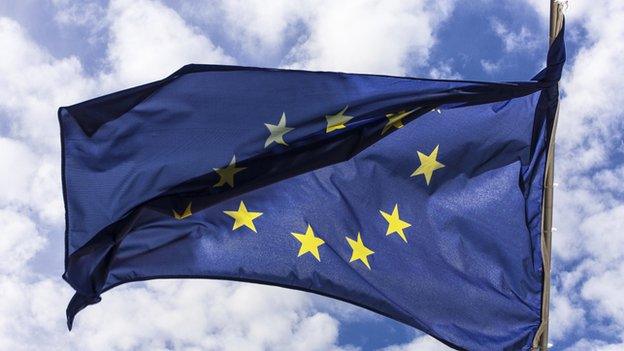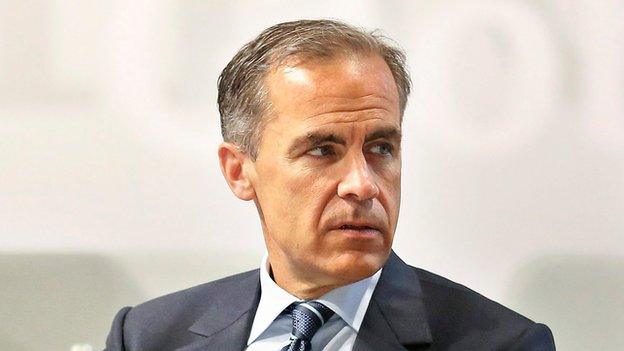Bank of England says EU makes UK economy more dynamic
- Published
The report found the UK economy was more open and go-ahead because of the EU, as Robert Peston reports
Membership of the EU has made the UK economy more dynamic and able to grow without generating inflation or a financial crisis.
That is the conclusion of a much-awaited Bank of England study.
It found the UK economy was more open and go-ahead because of its EU membership.
However, the Bank also found that that greater openness had made the UK more vulnerable to problems such as the recent euro crisis.
The Bank said it was "supportive" of further integration within the eurozone area.
'Benefits of openness'
But, it said that for those economies not in the single currency, there would be a need for "clear principles to safeguard the interests of non euro member states" when further integration went ahead.
Bank of England governor Mark Carney told an audience at St Peter's college, Oxford, external: "Broadly speaking, the evidence suggests the UK has successfully harnessed the benefits of openness afforded by its EU membership while avoiding some of the drawbacks of reduced flexibility from which some continental European economies suffer."
He added: "Put simply, economies with sustainable dynamism can grow more quickly before running into excessive price pressures. The UK's greater openness as a result of EU membership provides potential for both greater growth and greater shocks."

Analysis: Robert Peston, economics editor
Although the Bank does not use these precise words, EU membership has made the UK richer and more successful.
That will be seized on by supporters of the UK staying in.
Even so, there is ammunition for eurosceptics - namely that our financial openness made the UK more vulnerable to the eurozone's crisis, and that not all EU regulation suits the size and complexity of the City of London.

The bank identified trade and foreign direct investment as key ways the UK has benefited since joining the EU.
'Counter factual'
The senior official who ran the study, Deputy Governor Jon Cunliffe, said the UK's trade had increased by more than it would have "on standard models" and that trade costs had come down.
The Bank also pointed out that the UK had the biggest share of foreign investment in the EU.
But Mr Cunliffe declined to say whether a Brexit scenario, where the UK left the EU single market, would reverse some of those benefits. 'That's a counter factual which I can't know,' he said.
Banker bonuses
The Bank's analysis concluded that the increased openness of the UK economy owing to EU membership "reinforces the dynamism of the UK economy. A more dynamic economy is more resilient to shocks; can grow more rapidly without generating inflationary pressure or creating risks to financial stability".
The report could give some support to opponents of a Brexit.
But although the Bank said it was modelling what might happen should Brexit go ahead, it said it would not publish the results of this work until after a referendum took place.
Mr Carney criticised some EU measures, saying the cap on bankers bonuses would "weaken discipline from remuneration" because less pay could be clawed back.
Backing
The campaign group, Britain Stronger in Europe, interpreted the speech as backing for its own position, as did rival lobby group, Vote Leave.
Will Straw, executive director of BSiE, said: "The Governor of the Bank of England has now overwhelmingly made the case that our membership of the EU single market increases our stability, our dynamism, and our economic growth."
The co-chairman of Conservatives for Britain and Vote Leave supporter Steve Baker MP said: 'Mark Carney has sent a clear warning about the dangers of eurozone countries giving more power to Brussels.
'British jobs will be much safer if we have control of how our economy is regulated. The only way to get control is to Vote Leave and negotiate a new UK-EU deal based on free trade and friendly cooperation.'
Mr Carney said he did not want to chair the debate between the two side.
He said after the lecture at St Peter's: "We would not think it appropriate to act as a referee in terms of judging facts that will fly around."
- Published21 October 2015
- Published21 October 2015

- Published10 June 2015
